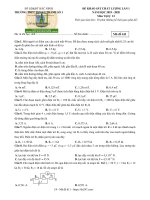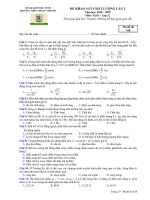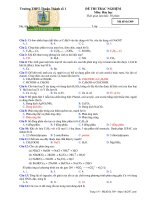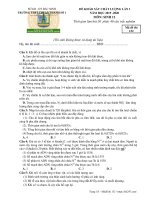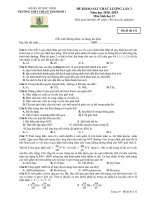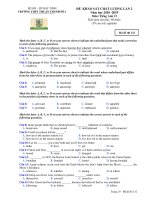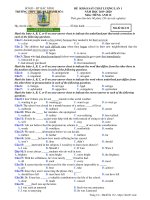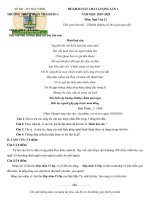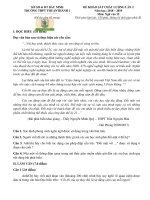Đề KSCL đầu năm lớp 12 năm học 2017 – 2018 môn tiếng anh trường THPT thuận thành 1 – bắc ninh
Bạn đang xem bản rút gọn của tài liệu. Xem và tải ngay bản đầy đủ của tài liệu tại đây (195.47 KB, 5 trang )
Trường THPT
Thuận Thành số 1
ĐỀ KHẢO SÁT CHẤT LƯỢNG KHỐI 12
Môn : Tiếng Anh
Thời gian làm bài : 60 phút
Mã đề 122
Mark the letter A, B, C, or D on your answer sheet to indicate the word whose underlined
part is pronounced differently from that of the rest in each of the following questions
Question 1. A. business
B. shut
C. summer
D. sunrise
Question 2. A. talked
B. passed
C. called
D. washed
Mark the letter A, B, C, or D on your answer sheet to indicate the word that differs from the rest in the
position of the main stress
Question 3. A. comfortable
B. confident
C. excellent
D. communicate
Question 4. A. geographical
B. economics
C. compulsory
D. education
Mark the letter A, B, C, or D on your answer sheet to indicate the correct answer to each unfinished
sentence.
Question 5. Last week, our class went to Ha Long Bay for a picnic, ___ made us very happy then.
A. of which
B. that
C. it
D. which
Question 6. Some people are concerned with physical _____ when choosing a wife or husband.
A. attractiveness
B. attractively
C. attractive
D. attract
Question 7. By the end of the 21st century, scientists _____ a cure for the common cold.
A. will find
B. will have found
C. will be finding
D. will have been finding
Question 8. His parents never allowed him…..
A. smoke
B. smoking
C. to smoke
D. smokes
Question 9. I felt extremely ___________ when I couldn’t remember my neighbour’s name.
A. embarrassed
B. embarrassment
C. embarrassing
D. embarrass
Question 10. There are no .....than 100 different species in the area.
A. fewer
B. few
C. less
D. little
Question 11. It is vital that food is made available.......the famine areas.
A. for
B. to
C. with
D. in
Question 12. The rhinoceros, whose numbers have dropped alarmingly recently, has been declared
a(n) ……… species.
A. danger
B. endangered
C. endanger
D. dangerous
Question 13. During the interview you should ________on what the interviewer is saying.
A. look
B. centralize
C. observe
D. concentrate
Question 14. Looking ______ three children all day is a hard work.
A. after
B. to
C. through
D. up
Question 15. Volunteers are happy when they take ……..of other people.
A. comfort
B. care
C. help
D. need
Question 16. I……….well recently, I ……….to see the doctor every weekend.
A. hadn’t slept / was going
B. don’t sleep / go
C. haven’t slept / go
D. won’t sleep / will go
Read the following passages and mark the letter A, B, C, or D on your answer sheet to indicate the correct
answer to each of the following questions
The biological community changes again as one moves from the city to the suburbs. Around all cities
is a biome called the "suburban forest". The trees of this forest are species that are favored by man, and most
of them have been deliberately planted. Mammals such as rabbits, skunks, and opossums have moved in from
the surrounding countryside. Raccoons have become experts at opening garbage cans, and in some places
even deer wander suburban thoroughfares. Several species of squirrel get along nicely in suburbia, but
usually only one species is predominant in any given suburb -fox squirrels in one place, red squirrels in
another, gray squirrels in a third – for reasons that are little understood. The diversity of birds in the suburbs is
great, and in the South, lizards thrive in gardens and even houses. Of course, insects are always present.
There is an odd biological sameness in these suburban communities. True, the palms of Los Angeles
are missing from the suburbs of Boston, and there are species of insects in Miami not found in Seattle. But
over wide stretches of the United States, ecological conditions in suburban biomes vary much less than do
those of natural biome. And unlike the natural biomes, the urban and suburban communities exist in spite of,
not because of, the climate.
Question 17. If there was a preceding paragraph to this passage it would most likely be concerned with
which of the following topics?
A. The migration from cities to suburbs.
B. The biological community in urban areas.
C. The mammals of the American countryside.
D. The history of American suburbs.
Question 18. The author implies that the mammals of the "suburban forest" differ from most species of trees
there in which of the following ways?
A. They were not deliberately introduced.
B. They are considered undesirable by humans.
C. They are represented by a greater number of species.
D. They have not fully adapted to suburban conditions.
Question 19. The word “thoroughfares” is closet in meaning to
A. neighborhoods
B. lawns
C. open spaces
D. streets
Question 20. Which of the following conclusions about squirrels is supported by information in the passage?
A. The competition among the three species is intense.
B. Fox squirrels are more common than grey or red squirrels.
C. Two species of squirrels seldom inhabit the same suburb.
D. The reasons why squirrels do well in the suburbs are unknown.
Question 21. The word "thrive" is closest in meaning to
A. remain
B. flourish
C. reproduce
D. survive
Question 22. The word "odd" is closest in meaning to
A. unusual
B. appropriate
C. unforgettable
D. expected
Question 23. Which of the following best expresses the main idea of the second paragraph of the passage?
A. Biological communities in East Coast suburs differ greatly from those on the West Coast
B. The suburban forest occupies an increasingly large segment of the American landscape
C. Surburbs in the Unites States have remarkably similar biological communities
D. Natural biomes have been studied more than surburban biomes
Question 24. What does the author imply about the effect of climate in the surburban biome?
A. It is more noticeable than the effect of climate on the urban biome
B. It is not as important as it once was
C. It depends on the location of the biome
D. It is not as dramatic as the effect of climate on natural biomes
Mark the letter A, B, C, or D on your answer sheet to indicate the word or phrase that is CLOSEST in
meaning to the underlined part in each of the following questions.
Question 25. The air is naturally contaminated by foreign matter such as plant pollens and dust.
A. polluted
B. occupied
C. filled
D. concentrated
Question 26. John, could you look after my handbag while I go out for a minute.
A. take part in
B. take over
C. take place
D. take care of
Mark the letter A, B, C, or D on your answer sheet to choose the sentence which best combine the pair of
sentences below.
Question 27. The college was closed for a month. It was the summer holidays.
A. The college was closed for a month as a result of the summer holidays.
B. The college was closed for a month as a result of that it was the summer holidays.
C. The college was closed for a month owing the fact of the summer holidays.
D. The college was closed for a month because the summer holidays.
Question 28. I did not dare to turn on television. I was afraid of walking the baby up
A. Walking the baby up, I could not continue watching the television.
B. I decided to turn the television down to avoid walking the baby up.
C. I decided not to turn the television down in order to wake the baby up.
D. I did not dare to turn on the television for fear of walking up the baby.
Mark the letter A, B, C, or D to indicate the word or phrase that is OPPOSITE in meaning to
the underlined part in each of the following questions.
Question 29. The earth is being threatened and the future looks bad.
A. done
B. made
C. defended
D. varied
Question 30. Traffic congestion in large cities seems to be a problem that is insoluble.
A. easily seen
B. easily experienced C. easily found
D. easily solved
Read the following passages and mark the letter A, B, C, or D on your answer sheet to indicate the correct
answer to each of the following questions
Four West Indian geckos, with human assistance, have recently entered the United States. The
yellow-headed gecko, the ashy gecko, the reef gecko, and the ocellated gecko are presently inhabiting the
tropical areas of the Keys and the tip of southern Florida. The Mediterranean gecko also arrived along the
Gulf coast some time ago, via the West Indies. The only other geckos in the United States live in the
Southwest. In extreme southern California, the leaf-gingered gecko lives in dry, rocky country and scampers
over boulders at night, hiding by day in crevices. The banded gecko inhabits the desert areas from southern
California to southern Texas. This three-to-four-inch nocturnal gecko has a slender, tapered tail and stalks
insects by raising itself high on its legs, cocking its head, and twitching its tail nervously before leaping on its
prey. In courtship, the tail is also waved by the male as he approaches the female.
Although most lizards are excellent climbers, the geckos are able to walk on smooth surfaces with the
help of unique clinging devices under the toes. Also, the undersides of most geckos have pads of large scales,
each of which bear microscopic hairs with hundreds of branches having minute, blunt ends that press against
the surface that the gecko is on, enabling the gecko to cling to almost any surface. Like other lizards, geckos
have the ability to shed their tails if attacked by an enemy. They stump heels and a new tail is grown in
approximately the same shape as the original. Unlike most lizards, most geckos have no moveable eyelids.
The nocturnal geckos have vertical pupils, which contract in bright light. All geckos, except several New
Zealand species, lay eggs. The eggs have a tough, white shell and are laid under stones, behind window
shutters or under bark.
Question 31. In line 1, the author uses the words “human assistance” to mean .
A. West Indian geckos were raised by human
B. people brought West Indian geckos to these areas s
C. humans saved West Indian geckos from extinction
D. West Indian geckos reached these places while escaping from humans
Question 32. According to the passage, the banded gecko .
A. lives in dry, rocky country
B. has a short, stout tail
C. recently entered the United States
D. is nocturnal
Question 33. Which of the following is cloest in meaning to the word “noctural”?
A. quick-moving
B. very poisonous
C. cold-blooded
D. active at night
Question 34. The word “minute” is cloest in meaning to...
A. very quick
B. very small
C. extremely hard
D. extremely fast
Question 35. The author’s main purpose is to…
A. compare lizards and geckos
B. describe the behavior and environment of geckos
C. analyze the life of gecko
D. illustrate the habits of geckos
Question 36. The passage would be most interest to...
A. statisticians
B. history professers
C. biology students D. social scientists
Question 37. What is the most likely subject of the paragraph following this passage?
A. Information on how baby geckos hatch and develop
B. The story of the journeys of West Indian geckos
C. A description of geckos native to North America
D. A history of the southern California desert
Mark the letter A, B, C, or D on your answer sheet to choose the sentence which is closest in meaning to
the given one.
Question 38. “Would you like to come to my birthday party, Sarha?” asked Frederic.
A. Frederic invited Sarha to his birthday party.
B. Frederic asked if Sarha was able to come to his birthday party.
C. Frederic asked Sarha if she likes his brithday party or not.
D. Frederic reminded Sarha of his coming birthday party.
Question 39. The last person who leaves the room must turn off the lights.
A. The last person to leave the room must turn off the lights.
B. The last person to turn off the lights must leave the room.
C. The last person to be left the room must turn off the lights.
D. The last person leave the room must turn off the lights.
Question 40. If you practise harder you will have better results.
A. The harder you practise, the best results you will have.
B. The more hardly you practise, the better results you will have.
C. The hardest you practise, the most results you will have.
D. The harder you practise, the better results you will have.
Mark the letter A, B, C, or D on your answer sheet to show the underlined part that needs correction.
Question 41 The man whom is standing over there is my teacher
A
B
C
D
Question 42 We are going to visit our grandparents when we will finish our final exams.
A
B
C
D
Question 43. He comes from a large family, all of them now live in Australia.
A
B
C
D
Read the following passage and mark the letter A, B, C, or D on your answer sheet to indicate the correct
word for each of the blanks.
Scientists say that … (44)… the next thirty we will not be able to tell the difference between the real people
and the virtual people- that is, people created by computer. These virtual humans are already in films and
computer games and engineers are setting up experiments to see if they can develop a … (45)…, feeling
virtual people. And the prediction is that these virtual people will be better than us humans- because they are
basically a machine, they can … (46)…data and remember it much better than we can. In addition, they are
starting to look much more like us. They are already used to …(47)…research that may be dangerous for
humans, such as on equipment for the army. The “virtuals” are very good at following procedures exactly so
scientists can get reliable results. Engineers are carrying out futher tests to find out how to get the virtual
beings to understand conversation. Now, we can only “talk” to them by typing. But if you …(48)…the
internet, you will find more and more sites devoted to virtual humans- we are just at the beginning of what
they can do.
Question 44. A. within
B. for
C. about
D. during
Question 45. A. speculating
B. thoughtful
C. thinking
D. mindful
Question 46. A. gather
B. accumulate
C. amass
D. collect
Question 47. A. proceed
B. conduct
C. convey
D. lead
Question 48. A. click
B. ride
C. seek
D. surf
Mark the letter A, B, C, or D on your answer sheet to indicate the most suitable response to complete each
of the following exchanges.
Question 49. “I think that the youth are high-flying but inexperienced”
“____________ “
A. There’ s no doubt about it.
B. Certainly
C. Are you kidding me?
D. It’s nice of you to say so
Question 50. - Janet: “ ______________.”
- Ellen: “Thanks. I will write to you when I come to London.”
A. Better luck next time
B. God bless you
C. Have a nice trip
D. Have a go
The end
Đáp án môn T. Anh 12 - Khảo sát đầu năm học 2017 -2018
Câu
1
2
3
4
5
6
7
8
9
10
11
12
13
14
15
16
17
18
19
20
21
22
23
24
25
26
27
28
29
30
31
32
33
34
35
36
37
38
39
40
41
42
43
44
45
46
47
48
49
50
Mã đề
122
A
C
D
C
D
A
B
C
A
A
B
B
D
A
B
C
B
A
D
C
B
A
C
D
A
D
A
D
C
D
B
D
D
B
B
C
A
A
A
D
B
D
C
A
C
D
B
D
A
C
Mã đề
123
B
A
B
D
C
C
B
D
B
A
D
A
A
C
B
C
A
A
B
B
C
B
D
C
A
C
A
D
C
D
A
D
D
B
B
C
B
A
A
D
C
D
D
B
D
A
C
D
B
C
Mã đề
124
B
A
D
D
C
A
B
D
C
B
C
D
A
D
B
C
D
D
B
C
B
A
B
A
A
B
C
D
C
C
D
A
A
C
B
B
A
C
D
A
B
C
D
B
C
A
C
D
C
B
Mã đề
125
C
B
C
C
B
A
A
B
C
D
C
B
B
D
D
A
C
A
A
D
D
C
B
C
B
C
B
D
C
B
A
D
D
C
D
A
A
C
A
B
A
C
D
D
C
B
D
C
C
A
Mã đề
126
C
A
B
A
D
A
B
D
B
D
C
B
A
C
A
C
D
B
C
B
C
A
C
C
B
D
C
A
D
C
C
A
D
A
A
D
C
C
B
A
C
A
B
D
C
C
B
C
D
D
Mã đề
127
D
C
D
A
A
D
C
C
A
A
B
D
A
D
C
D
B
C
A
D
C
A
B
D
D
B
C
A
A
B
A
C
C
A
D
C
C
B
D
B
C
D
A
B
D
C
B
C
A
D
Mã đề
128
D
A
C
D
C
B
A
B
C
B
D
D
B
A
B
D
C
B
A
D
D
C
B
A
D
A
D
D
B
C
D
A
C
C
B
D
A
A
B
C
A
C
B
D
C
B
A
C
D
C
Mã đề
129
C
B
C
B
C
C
A
B
A
A
C
D
D
B
A
D
B
B
C
A
A
B
D
C
A
D
D
B
C
B
D
A
C
D
D
A
D
A
A
D
C
C
B
A
C
D
C
A
D
B
